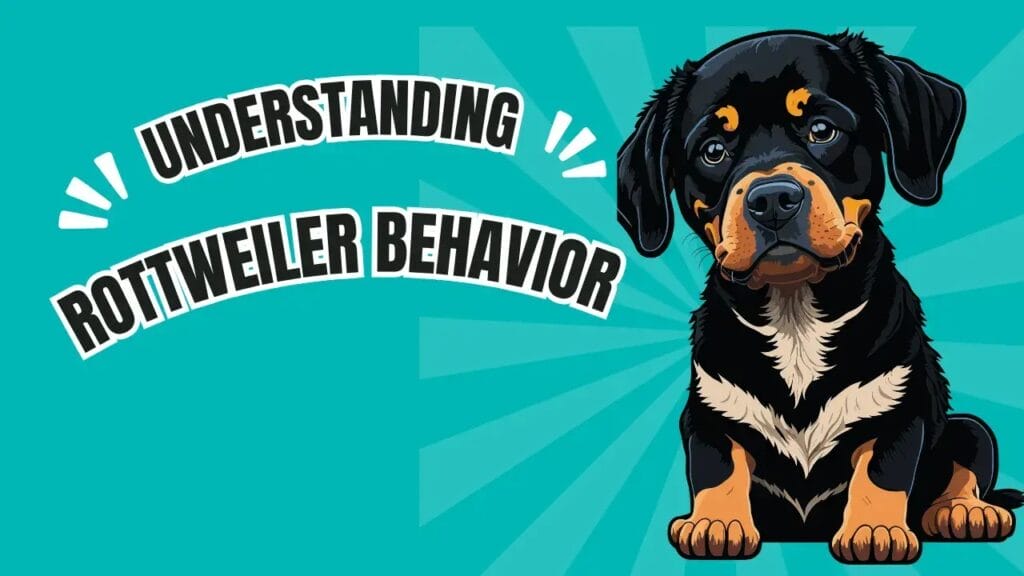Rottweiler Behavior Problems: Causes and Solutions
Rottweiler Behavior Problems? Rottweilers are known for their quality, dependability, and insights. These grand puppies make excellent companions and defensive family individuals when well-trained and appropriately socialized.
Be that as it may, like all breeds, Rottweilers can encounter behavioural issues that can challenge proprietors and affect their quality of life. This comprehensive directive will investigate common Rottweiler behaviour issues, their causes, and practical arrangements while recommending avoidance.
“Understanding Rottweiler Behavior: Training Tips for a Well-Behaved Companion”

Rottweilers are a highly intelligent and protective dog breed, making them both excellent companions and effective guard dogs. However, understanding Rottweiler behavior is crucial for addressing common behavior problems like aggression or destructive tendencies.
Early socialization and proper training, including positive reinforcement techniques, are essential for shaping a well-behaved Rottie. For dog owners dealing with aggressive behavior or signs of poor temperament, consulting a professional dog trainer can provide expert tips tailored to your pet’s needs.
Whether you’re raising a puppy or working with an adult Rottweiler, training sessions should be short, consistent, and engaging to match their energy levels and mental stimulation requirements.
“Effective Training Tips for Understanding and Managing Rottweiler Behavior”
Rottweilers are a loyal and protective breed, but understanding Rottweiler behavior is essential to address potential behavior problems effectively. Early socialization and proper training, including positive reinforcement, are crucial for raising a well-behaved Rottie. Signs of aggression in Rottweilers, such as growling or barking, can often be managed with the right training techniques and obedience training.
For dog owners, seeking expert tips from professional trainers can help ensure their Rottweiler develops good behavior traits. Whether you have a playful puppy or a year-old Rottweiler, consistent training and mental stimulation are key to keeping your pet balanced and happy.
Early socialization is crucial for managing aggression in Rottweilers and preventing destructive behavior. Proper training and positive reinforcement help establish a well-behaved and balanced Rottie, whether it’s a playful puppy or a year-old Rottweiler.
For dog owners, expert tips from trainers can provide valuable guidance on leash training and managing temperament.
1. Animosity
Hostility is one of the foremost critical concerns for Rottweiler proprietors. They can be seen snarling, snapping, or gnawing and may be coordinated at other creatures, outsiders, or family members. A few variables can contribute to forceful behavior:
- Need for Socialization: Rottweilers not socialized in distinctive individuals, creatures, and situations early in life may become fearful or forceful.
- Defensive Instinct: Rottweilers are average defenders. They can respond aggressively if they perceive a threat to their family or domain.
- Torment or Distress: Hostility can now and then be a sign of torment or distress. If your Rottweiler is harmed or unwell, they might lash out.
- Arrangement: To oversee hostility, begin with early and steady socialization. Uncover your Rottweiler for different individuals, pets, and situations in a controlled way. Positive reinforcement can offer assistance to them in learning fitting behaviors. If hostility is profound, counsel a proficient dog-training coach.
2. Division Uneasiness
Diarrhoea is another common issue in Rottweilers. These mutts form solid bonds with their families and can get troubled when left alone. Indications include intemperate woofing, damaging behavior, and endeavors to elude.
- Arrangement: Slow desensitization is critical. Begin by taking your Rottweiler out alone for brief periods and steadily increment the length. Give them intelligent toys or treats that can keep them possessed, whereas you are absent. Setting up a reliable schedule can moreover offer assistance to diminish uneasiness. In extreme cases, a veterinarian or a pooch behaviorist may prescribe pharmaceutical or progressed preparation procedures.
3. Over the top yapping
Rottweilers can be vocal puppies, and over-the-top yapping can be noteworthy. This behavior can be activated by boredom, uneasiness, or wanting to alert their proprietors to see dangers.
- Arrangement: Guarantee your Rottweiler gets satisfactory physical and mental stimulation. Regular workouts and intelligent toys can anticipate boredom. Preparing your canine to respond to commands like quiet or enough can offer assistance to control intemperate Yapping. Reliable preparation and fulfilling calm behavior will strengthen positive propensities.
4. Damaging Chewing
Damaging chewing is regularly a sign of boredom or teething in puppies. Being a solid breed, Rottweilers can cause critical harm if they chew on improper things.
- Exercise: Give your Rottweiler a bounty of chew toys to guarantee they get sufficient physical workouts. Divert their chewing behavior by advertising suitable things to chew on. Preparation and supervision can also offer assistance to avoid damaging chewing propensities.
5. Dreadfulness
Some Rottweilers may exhibit fear or apprehensive behavior in certain circumstances. This could incorporate groveling, stowing away, or responding forcefully out of fear.
- Arrangement: Progressive introduction to dreaded circumstances, combined with positive support, can offer assistance to construct confidence in dreadful Rottweilers. Maintain a strategic distance from discipline because it can compound dreadfulness. Creating a secure and safe environment where your Rottweiler can withdraw can be helpful.
“Raising a Balanced Rottweiler: Tips for Training and Socialization Success”
A 4-year-old Rottweiler or even a week-old Rottweiler puppy requires proper training and socialization to develop into a well-behaved dog with positive behavior traits.
Rottweilers are highly intelligent and eager to please, but their large size and protective instincts mean that every dog needs consistent training to prevent bad behavior.
Pet owners should focus on early socialization to avoid aggression in dogs and ensure their Rottie is properly trained and socialized. Frequent visits to the dog park, coupled with training classes, can provide the mental stimulation and exercise they need.
If aggression persists, seeking expert help from a trainer specializing in breeds like Rottweilers would be great for maintaining a balanced and well-behaved companion.
Causes of Rottweiler Behavior Issues

Understanding the primary causes of behavior issues is pivotal for compelling administration. Here are a few common causes:
1. Hereditary qualities
Hereditary qualities can play a part in behavior. Some Rottweilers may be inclined to specific behavioral characteristics due to their heredity. In any case, hereditary qualities alone don’t determine behavior; preparation and environment play critical parts.
2. Need for Socialization
Rottweilers who haven’t been satisfactorily socialized during their primary formative stages may battle with different behavioral issues. Socialization makes a difference; mutts learn how to connect fittingly with other creatures and individuals.
3. Insufficient Preparation
Without proper preparation, Rottweilers may not learn satisfactory behaviors. Conflicting or erroneous preparation can lead to perplexity and behavioural issues.
4. Well-being Issues
Behavior can be affected by health problems. Pain, anguish, or ailments can lead to shifts in behaviour, encompassing antagonism or seclusion. Standard veterinary check-ups can offer assistance to run the show out of well-being issues.
5. Natural Components
The environment in which a Rottweiler lives can impact their behaviour. Unpleasant or chaotic situations can contribute to uneasiness and other behaviour issues.
Arrangements and Anticipation
Adopting a preventative strategy and maintaining a steady hand is crucial to effectively manage behaviour issues in Rottweilers.
Here are a few methodologies for avoiding and tending to issues:
1. Early Socialization
Early and advancing socialization is noteworthy. Acclimate your Rottweiler to assorted people, creatures, and situations beginning from its youthful age. This time may bring approximately various behavioural issues due to positive experiences.
2. Reliable Preparation
The arrangement was solid and positive. Utilize reward-based planning methodologies to engage extraordinary behaviour and address issues early. Commands, like sit, stay, and come, can offer help supervising behaviors and fortify the bond between you and your Rottweiler.
3. Satisfactory Work out and Mental Incitement
Rottweiler’s physical and mental well-being is ensured through routine walks, play sessions, and the employment of stimulating toys. Additional intellectual growth can be fostered through extracurricular activities like attending classes.
4. Veterinary Care
Frequent medical check-ups are essential for promptly detecting and addressing health issues arising from a minor time-lapse.
5. Proficient Offer assistance
When faced with general behavioral problems or concerns in dogs, it’s wise to consult a qualified dog trainer or handler for personalized recommendations and proven techniques.
Conclusion
Rottweilers are an exceptional breed known for their quality, dependability, and insights. In any case, like all puppies, they can involve behavioural issues that require consideration and administration. By understanding common issues such as hatred, partition uneasiness, intemperate yapping, damaging chewing, and dreadfulness, Rottweiler proprietors can take proactive steps to address and anticipate these issues.
Frequently Asked Questions:
1. What should I do if my Rottweiler appears animosity toward other pooches?
If your Rottweiler appears hostile toward other pooches, begin by guaranteeing they are legitimately socialized. Continuous introductions to other mutts in controlled settings can offer assistance. Utilize positive fortification to compensate for calm behaviour; counsel a proficient pooch coach or behaviourist who can focus on methodologies and direction on the off-chance of hostility.
2. How can I offer assistance to my Rottweiler with partition uneasiness?
To assist your Rottweiler with partition uneasiness:
If their uneasiness is severe, consider seeking exhortation from a veterinarian or a behaviourist, who may recommend particular preparation methods or medicine.
Begin by slowly expanding the time they spend alone.
Give them intelligent toys or treats that can keep them locked in.
Build a reliable schedule and maintain a strategic distance from emotional flights or entries.
3. Why does my Rottweiler bark unreasonably, and how can I halt it?
Yapping in Rottweilers can be due to boredom, uneasiness, or a craving to caution their proprietors. Guarantee your Rottweiler gets a sufficient workout and mental incitement to decrease boredom. Prepare commands like Quiet Enough can offer assistance in overseeing woofing. Steady positive fortification when they are calm will strengthen the specified behaviour.
4. My Rottweiler is chewing on everything. What can I do to halt this behaviour?
Dangerous chewing regularly shows boredom or getting teeth. Give an assortment of suitable chew toys to divert their chewing behaviour. Guarantee your Rottweiler gets a sufficient physical workout and mental incitement to anticipate boredom.
5. What are a few signs that my Rottweiler may be frightful or on edge?
Signs of dreadfulness or uneasiness in Rottweilers incorporate cringing, stowing away, intemperate woofing, or forceful responses. They may, moreover, display changes in behaviour, such as hesitation to connect or withdrawal from specific circumstances.
6. How can I avoid behavioural issues in my Rottweiler puppy?
Avoid behavioural issues in your Rottweiler puppy by beginning with early socialization and positive preparation. Uncover them for individuals, pets, and situations to construct certainty and decrease dreadfulness. Give suitable chew toys, guarantee they get a bounty of work out, and build steady schedules.











